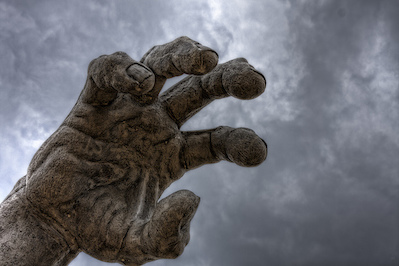Rethinking Orwell’s ‘1984’ and Huxley’s ‘Brave New World’ in Trump’s America
For Aldous Huxley, there was hope in a pessimism that had exhausted itself; for George Orwell, optimism had to be tempered by a sense of educated hope. Jason OX4 / CC BY-SA 2.0
1
2
3
4
Jason OX4 / CC BY-SA 2.0
1
2
3
4
If you want a picture of the future, imagine a boot stamping on a human face—forever.
SUPPORT TRUTHDIG
— George Orwell
The propagandist’s purpose is to make one set of people forget that certain other sets of people are human.— Aldous Huxley
George Orwell’s nightmarish vision of a totalitarian society was first made visible in his great novel 1984. Orwell’s dystopian world provided a prescient and stunningly prophetic image of the totalitarian machinery of the surveillance state, brought to life in 2013 by Edward Snowden’s exposure of the mass spying conducted by the NSA. Orwell also made clear how language functioned in the service of violence, deception, and misuse, and he warned in exquisite detail how “totalitarian practice becomes internalized in totalitarian thinking.” Orwell illustrated his point by providing examples of language that undermined the critical formative culture necessary to a democracy. His most recognized examples of language designed to eliminate “thought crimes” included Ministry of Truth slogans such as: “War is Peace,” “Freedom is Slavery,” and “Ignorance is Strength.” Unfortunately, the discourse of remolding, manipulation, and distortion has gained enormous traction at the present time in American society. This is a discourse that reinforces a future in which totalitarianism thrives and democracies die. It is the discourse of a dystopian society marked by a deep-seated anti-intellectualism intensified by the incessant undermining and collapse of civic literacy and civic culture. It is also the language of expurgation, one that targets memory, dissent, and history while appealing to a notion of common sense in which facts are regarded with disdain, words reduced to slogans, and science confused with pseudo-science. As Orwell often remarked, historical memory is dangerous to authoritarian regimes because it has the power to both question the past and reveal it as a site of injustice. In 1984, Orwell provides a hint of the totalitarian state’s view of history in an exchange that takes place between O’Brien, the antagonist, and a prominent leader in the Inner Party and Winston Smith, the protagonist. Questioning Smith about history, O’Brien lays bare the official view of memory. Responding to Smith’s comment that history resides in memory, O’Brien states “In memory. Very well, then. We, the Party, control all records, and we control all memories. Then we control the past, do we not?” In Orwell’s Ministry of Truth, it is a crime to read history against the grain. In fact, history is falsified so as to render it useless as a crucial pedagogical practice both for understanding the conditions that shape the present and for learning what should never be forgotten. As Orwell makes clear, this is precisely why memory is often considered dangerous by tyrants because it offers the opportunity to learn how to remember differently. The fear of reading history so as to remember monstrous acts that should never be repeated was made visible recently when the Trump administration issued a statement regarding the observance of International Holocaust Remembrance day. In the statement, the White house refused to mention Jewish victims, thus erasing them from a monstrous act directed against an entire race of people. The chain of events surrounding the disappearance of any statement about the Nazi extermination of the Jews are revealing. After the State Department drafted a statement that explicitly mentioned Jewish victims of the Holocaust, the White House rejected the statement and issued its own version omitting any mention of either Jewish suffering or the obvious fact that the elimination of Jews was the central organizing principle that shaped Nazi policy. Politico reported that the official White House “statement drew widespread criticism for overlooking the Jews’ suffering, and was cheered by neo-Nazi website the Daily Stormer.” This reads like a passage out of Orwell’s 1984. This act of erasure is but another example of the willingness of the Trump administration to empty language of any meaning, a practice that constitutes a flight from historical memory, ethics, justice, and social responsibility. Under such circumstances, society takes on the workings of a dis-imagination machine, legitimized by an utter disregard for the truth, and often accompanied, as in Trump’s case, by “primitive schoolyard taunts and threats.” In this instance, Orwell’s “Ignorance is Strength” materializes in the Trump administration’s attempt not only to put history on trial, but to rewrite and obliterate it. His contemptuous boisterous claim that he loves the uneducated and his willingness to act on that assertion by flooding the media and the American public with an endless proliferation of peddled falsehoods reveal his contempt for reason and the truth. As the master of phony stories, Trump is not only at war with historical memory, reason, science, and rationality, he also wages a demolition campaign against democratic ideals embracing without apology the discourse of bigotry, humiliation, racism, and scorn for those he labels as terrorists, losers, and disposable, especially for those citizens of seven Muslim-majority countries banned from entering the United States. This is the language of hate and demonization and as John Wight observes, “it is redolent of the demonization suffered by Jewish people in Germany in the 1930s, which echoes a warning from history.” Orwell’s point about duplicitous language was that all governments lie. Of course, the corrosive plague of rhetorical manipulation captured in Orwellian language is not distinctive to the Trump administration, though it has taken on an unapologetic register in defining it. The draconian use of lies, propaganda, misinformation, and falsification has a long legacy in the United States, especially as it was used under the presidency of George W. Bush. For example, under the Bush-Cheney administration, “doublethink” and “doublespeak” became normalized as state sponsored torture was shamelessly renamed as “enhanced interrogation,” while laws that violated civil liberties implied their opposite with names such as the Patriot Act and the National Authorization Defense Act. Barbaric state practices such as sending prisoners to countries where there were no limits on torture were wrapped in innocent sounding deceits such as “rendition.” Rather than being censored, dissenting views and damaging reports were “redacted.” Educational policies that imposed pedagogies of repression, boredom, and harsh discipline were bundled together under the utterly inappropriately named policy, No Child Left Behind. Such language not only cheapened public discourse and eroded civic culture, it also contributed to a culture in which institutions that were meant to limit human suffering and misfortune, and protect the public from the excesses of the market and state violence, have been either weakened or altogether abolished. Your support matters…Independent journalism is under threat and overshadowed by heavily funded mainstream media.
You can help level the playing field. Become a member.
Your tax-deductible contribution keeps us digging beneath the headlines to give you thought-provoking, investigative reporting and analysis that unearths what's really happening- without compromise.
Give today to support our courageous, independent journalists.





You need to be a supporter to comment.
There are currently no responses to this article.
Be the first to respond.